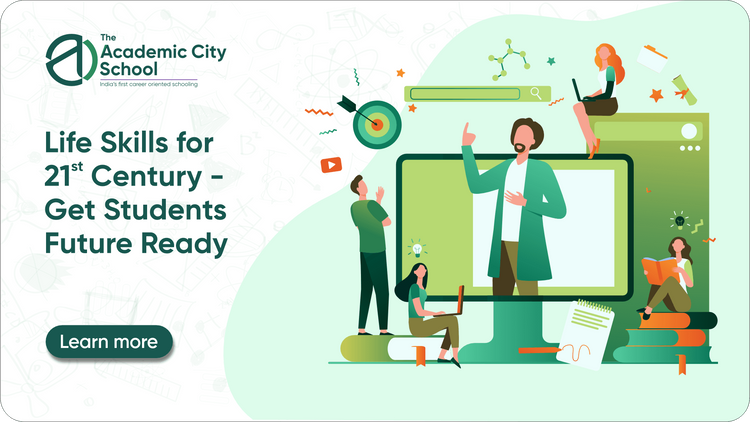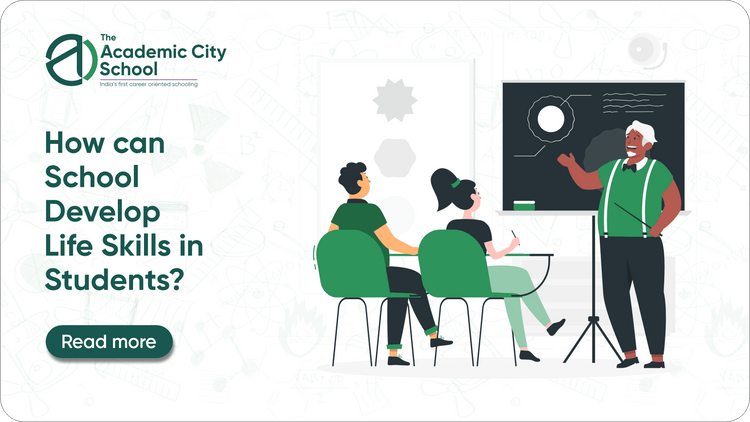Life skills for 21st century – Get students future ready
Life skills are those aspects of personality and attitude that help a person navigate through challenging and competitive life situations at work or in personal life. It includes interpersonal skills such as effective assertive communication and interpersonal skills to collaborate with people to solve problems or resolve conflicts. It also includes intrapersonal skills such as emotional self awareness, risk taking tendency, time management and decision making.

Why are life skills important?
Life skills have always been important for success in personal and professional life. However the advent of artificial intelligence is transforming the nature of work itself like never before. Also the COVID-19 experience has accelerated such transformation. Old jobs are getting eliminated and new jobs and occupations are getting created. The challenges of modern life and work, puts a person’s life skills to arduous test.
The research conducted by the famous McKinsely Global Institute identified 4 foundational skills required for careers of the future out of which 3 skills fall in the realm of life skills. These skills will help a person irrespective of their profession or industry they work in. The report also suggests that such possessing such skills is associated with higher likelihood of employment, income and job satisfaction. You can read the full report here - https://www.mckinsey.com/industries/public-sector/our-insights/defining-the-skills-citizens-will-need-in-the-future-world-of-work
Why should a school teach life skills?
We all have had moments in our life when we thought ‘I wish someone had told me about this’ or ‘I wish I learnt this in school’. Most of us agree that the purpose of schooling is not mere academic knowledge and passing of board exams. Childhood is a window of opportunity when a child’s personality and attitude can be shaped in desirable ways. And a school where children spend most of their time should enhance their curriculum to provide holistic and skill oriented education that will prepare the child for future challenges of life.
So what are the different life skills students can learn in school?
Life skills can be broadly divided into intrapersonal and interpersonal skills. Intra-personal skills are aspects of a person’s belief, values, world views, thought processes and opinions that shape his/her personality. Interpersonal skills are our style and approach in interacting with others. Interpersonal skills greatly influence interpersonal skills because the quality of our social relationships is a reflection of our inner self. The most important life skills students should learn are:
Inter-personal life skills
Communication skills – The most important and highly valued skill is the ability to put forth one’s thoughts and opinions in an assertive yet sensitive manner. Ability to effectively communicate is at the heart of every good relationship at work and in personal life as well. In fact, people who can communicate well are seen as potential leaders who have good command over other people, who can resolve conflicts and lead a team towards success. From day to day transactions to international affairs and everything in between, hinges on good communication skills.
Negotiation and conflict resolution – Every situation in life from buying vegetables on the street to breaking a business deal involves negotiation between people. Negotiation is the art of dividing the ‘cake’ in such a way that everyone thinks they got the biggest pie. It is the ability to find common ground of agreement when there are conflicting interests. Good negotiation can resolve conflicts and pave way to collaboration.
Developing and maintaining good relations – There is not a single meaningful work that can be accomplished without the cooperation and involvement of another human. Society is a network of human relationships and we all rely on each other to get our things done. The ability to build trust, treat others with empathy, behave with humility, listen actively, draw healthy boundaries and help others grow is vital for one's own growth and satisfaction.
Team work – To be prowess to sacrifice self-interest to achieve a bigger team goal is vital to being a leader. To be able to lead by example, to cooperate, be willing to learn and teach, share credit, shoulder responsibility and mediate between different people is necessary if one wants to climb the career ladder.
Intra-personal life skills:
Self awareness – Simply put, it is the ability to consciously understand and carefully examine one’s own thoughts, feelings, intentions, motives and actions. Self awareness is the stepping stone to self-control and self-regulation. A person who can control himself can conquer the world. Self awareness and self control is important to develop discipline, good habits, delay gratification and work hard. It is also important to regulate our reactions towards others and thus develop good social relations too.
Emotional resilience – Life is full of ups and downs, challenges, and testing situations. Sometimes we get our way through things but many times we have to sacrifice, let go, compromise and face rejection. While we rejoice in success, we have to be optimistic and upbeat during daunting circumstances. One must have good sense of self-worth and confidence to be resilient in life.
Self- management – External controls such as fear of punishment cannot motivate a person for a long time. Maturation requires a person to move towards greater self control and self management. To direct oneself, prioritize goals, effectively manage time, motivate oneself, delay gratification, taking care of one’s health, volunteering to take up responsibility are desirable qualities that will lead to success in life.
Openness, flexibility and self-learning – This is one of the greatest skills a person could possess in today’s ever changing world of technological innovations. One must be plastic enough, open enough to learn constantly and adapt to changing situations. A pond of stagnant water putrefies. A man who is not flexible and quick to learn will become obsolete and dispensable.

How can school develop life skills in students?
A school should formulate a balanced and holistic curriculum to address all developmental needs of children - intellectual, academic, social, emotional, creative, physical, moral and spiritual so that they become well rounded, socially responsible, morally virtuous, economically productive, and spiritually strong individuals. There must be enough balance between academics, sports, cultural and community activities in the curriculum. The curriculum must give children an opportunity to go beyond the classroom and learn from real life to develop a well rounded personality.
School should encourage experiential learning. Students must be engaged with hands-on experience and reflection. The school must be equipped with good facilities such as laboratory, library, maker’s space with tools and equipment to experiment, field trips and community service activities. There must be creative fusions such as learning communication and language through theater or learning teamwork through sports or learning self-awareness through community service. Such activities provide space for students to apply their knowledge in real life situations and reflect, practice necessary life skills, learn from mistakes and accelerate their learning.
The school should respect the individuality of the child by nurturing their natural interest to grow and take shape. Children should have the freedom to ask questions, explore and experiment. The accepting cognitive diversity in children must be accepted and acknowledged. Some children naturally take to mathematics and science, some others are great at putting forth an argument and still others are good with art, craft and storytelling. A school should be able to nurture these natural inclinations in children and further professionally guide them to pursue diverse fields of education. This is important in developing life skills such as confidence, self believe and motivation in children.
A school should encourage sports and other physical activities. Play ground is a microcosm of life. Sports prepare children for the challenges of adult life. As nutritious food is vital for the development of health body, engagement in physical activity is vital for the development of a healthy mind. Most of the necessary life skills such as team work, negotiation, conflict resolution, building good communication and self management can be developed on the playground.
Life skills classes must be interwoven into the curriculum. Such classes must invite people from different walks of life to interact with students. There must be discussions and debates conducted on a regular basis to develop awareness on major issues such as mental health, teenage issues, gender sensitivity, confidence and trust building exercise etc so that children learn to express and learn from each other. There must be facilities for mentoring beyond academics and psychological counseling available at the school to help all round development of students.
Life skills development @ TAC School
We at TAC School follow a curriculum that brings to life all aspects required for development of life skills in children. Being a residential school, the school is at liberty to offer a Variety of activities without time constraints. The curriculum of the school is carefully crafted to provide an excellent balance between academics, sports, cultural activities, outdoor trips, recreation and community activities. The infrastructure includes various sports facilities, space for a variety of outdoor activities, laboratory, maker’s space, library, gardening, vegetarian kitchen, hostel facility and more to support life skills development.
Each teacher working at TAC School is carefully handpicked through an extensive process of interview to suit the larger vision of the school. The school has a mentoring and psychological counseling program to take care of the emotional and social needs of the students. The school also has an exclusive career guidance cell that ropes in activities and programs to nurture the natural inclination of children and guide them to turn it into fetching careers.
Being a boarding school, TAC School by design provides a conducive environment for children to build their character. Staying away from parental control and protection, children naturally build emotional resilience, patience to wait their turn, learn to cooperate and work in collaboration with friends and teachers, develop independent thinking and become self-directed. The schools act as a microcosm of the larger world and teach children to tackle real life problems.
Conclusion
We at The Academic City School encourage all our prospective parents to spend a day with us when they come in for an enquiry. They are encouraged to understand all the programs and activities of the school in detail, interact with teachers, go through extensive campus tours, interact with principal and get a firsthand experience of how the school’s vision is expressed on ground. Choosing the right school is the best way to secure your child’s future. We invite you to visit our campus at Bengaluru!





